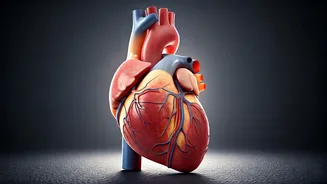Silent Heart Attacks Unveiled
A silent heart attack, also known as a silent myocardial infarction, is a heart attack that presents with minimal or no noticeable symptoms. This makes
it particularly dangerous because individuals may not realize they're experiencing a life-threatening event, leading to delayed medical intervention and potentially more severe consequences. Unlike the classic heart attack, which is characterized by intense chest pain, silent heart attacks often present with vague or less alarming symptoms that are easily dismissed or attributed to other conditions. This lack of obvious symptoms can cause significant delays in seeking necessary medical attention, increasing the risk of complications such as heart failure, irregular heartbeats, and even sudden cardiac death. The insidious nature of silent heart attacks makes it crucial to be aware of the less apparent warning signs and to seek medical advice promptly if any concerning symptoms arise.
Unusual Symptoms Explained
The symptoms of a silent heart attack can vary widely, and may include seemingly unrelated issues such as mild chest discomfort or pressure, shortness of breath, fatigue, indigestion, or even a feeling of general unease. Some individuals may experience symptoms that they might attribute to other health concerns, such as bloating, burping, or a feeling of fullness in the chest, leading them to delay seeking medical attention. It is also common for individuals to feel pain radiating to the jaw, neck, back, or arm. These symptoms can be subtle or intermittent, making them easy to ignore or misinterpret. Often, individuals may dismiss these as minor ailments, leading to a delay in diagnosis. This is especially true for older adults, women, and people with diabetes, who may be more prone to experiencing atypical symptoms during a heart attack. Recognizing and understanding these less obvious symptoms is essential for early detection and timely intervention, significantly improving outcomes.
Recognizing the Risks
Several factors can increase the risk of experiencing a silent heart attack. People with pre-existing conditions like diabetes are at higher risk because the nerve damage associated with diabetes can make it harder to feel pain, therefore masking the usual warning signs of a heart attack. Individuals with high blood pressure, high cholesterol, and those who smoke are also more susceptible, as these conditions damage the arteries and increase the likelihood of blockages. Lifestyle choices, such as a sedentary lifestyle, unhealthy diet, and chronic stress can contribute to heart disease, increasing the probability of silent heart attacks. Family history also plays a role, as genetics can increase one's predisposition to cardiovascular diseases. Early detection is a vital component of successful management, so being aware of the risk factors and recognizing even mild or unusual symptoms is critical. Regular check-ups and a healthy lifestyle can significantly reduce the risk and improve heart health.
Taking Action, Staying Safe
If you experience any of the symptoms mentioned, especially if you have existing risk factors for heart disease, it is critical to seek immediate medical attention. Do not dismiss symptoms like bloating, burping, or chest discomfort as harmless, particularly if they are new or worsening. The quicker you seek medical care, the better the outcome. Doctors can perform various diagnostic tests, such as an electrocardiogram (ECG) to check for heart activity and blood tests to measure cardiac enzymes, which indicate heart damage. Lifestyle modifications are also crucial for heart health. These include a balanced diet low in saturated and trans fats, regular physical activity, maintaining a healthy weight, and managing stress levels. If you are a smoker, it is vital to quit. Following medical advice and taking prescribed medications are equally important in preventing future cardiac events. By being proactive about your health, recognizing the warning signs, and seeking timely medical care, you can significantly reduce your risk of a silent heart attack and protect your well-being.



















